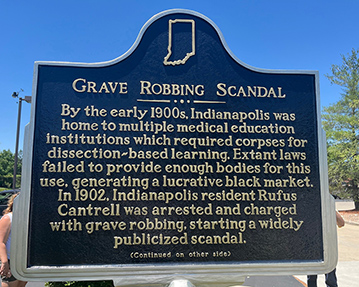Grave robbing, the act of disturbing a burial site for illicit purposes, is a deeply disturbing crime that violates the sanctity of death and the grief of loved ones. It’s a transgression that carries significant legal weight and can result in severe penalties. This article delves into the legal ramifications of grave robbing, exploring the definitions, consequences, and factors that influence sentencing. Understanding the gravity of this offense is crucial for respecting the dignity of the deceased and upholding the law.
This article will first define grave robbing and its various forms. We’ll then examine the legal consequences associated with this crime, outlining the potential penalties and the factors that judges consider when determining sentences. Finally, we’ll emphasize the importance of respecting burial sites and the ethical considerations surrounding grave disturbance.
Grave Robbing Defined
Grave robbing encompasses a range of actions that involve the unlawful disturbance of a burial site. It can include the exhumation of remains, the removal of grave goods, and the desecration of tombstones or other memorial markers. The motivations behind grave robbing can vary, ranging from financial gain through the sale of artifacts to morbid curiosity or even acts of vandalism.
Types of Grave Robbing
Grave robbing can manifest in several ways:
- Exhumation for Profit: This involves digging up graves to steal valuable items, such as jewelry, coins, or religious artifacts, which are then sold on the black market.
- Desecration for Malice: This type of grave robbing involves intentionally damaging or defacing gravesites out of hatred, disrespect, or a desire to cause harm.
- Archaeological Grave Robbing: While legitimate archaeology involves careful excavation and documentation, illegal grave robbing often occurs when individuals or groups dig up graves for personal gain or to sell artifacts without proper authorization.
Legal Consequences of Grave Robbing

Grave robbing is a serious crime that carries severe legal consequences. The specific laws and penalties vary depending on the jurisdiction, but the act is generally considered a felony offense.
Criminal Charges
Individuals caught grave robbing can face a range of criminal charges, including:
- Grave Robbery: This is the most direct charge, encompassing the unlawful disturbance of a burial site.
- Theft: If grave goods are stolen, additional charges of theft or larceny may be filed.
- Desecration of a Tomb: This charge specifically addresses the intentional damage or defilement of a grave or memorial.
- Vandalism: If grave markers or other property are damaged, vandalism charges may apply.
Penalties for Grave Disturbance
The penalties for grave robbing can be substantial, ranging from fines to lengthy prison sentences.
Jail Time
The amount of how much jail time for digging up a grave can vary widely depending on the severity of the offense and the specific laws of the jurisdiction.
- Misdemeanor Grave Robbing: In some cases, less serious instances of grave disturbance may be classified as misdemeanors, resulting in fines and shorter jail terms, potentially up to a year.
- Felony Grave Robbing: More serious offenses, such as exhumation for profit or desecration, are typically treated as felonies, carrying potential sentences of several years to decades in prison.
Other Penalties
In addition to jail time, individuals convicted of grave robbing may face other penalties, including:
- Fines: Substantial fines can be imposed to deter future offenses and compensate for damages.
- Restitution: Convicted individuals may be ordered to pay restitution to the victims or their families for any financial losses or emotional distress caused by the crime.
- Probation: After serving a prison sentence, individuals may be placed on probation, requiring them to meet certain conditions, such as regular drug testing or counseling, to avoid further legal trouble.
Factors Influencing Sentencing

When determining the sentence for grave robbing, judges consider a variety of factors to ensure that the punishment fits the crime.
Intent
The defendant’s intent plays a crucial role in sentencing. Grave robbing motivated by financial gain or malicious intent is viewed more seriously than accidental or unintentional disturbances.
Severity of the Offense
The nature and extent of the grave disturbance are also taken into account. Exhuming remains and stealing grave goods carries a heavier penalty than simply damaging a tombstone.
Prior Criminal History
A defendant’s prior criminal record can influence the severity of the sentence. Repeat offenders or those with a history of violent crimes may face harsher penalties.
Cooperation with Authorities
If a defendant cooperates with law enforcement and provides information that leads to the recovery of stolen items or the apprehension of other offenders, this may be considered a mitigating factor in sentencing.
Respect for Burial Sites
Grave robbing is not only a crime but also a profound violation of respect for the dead and their grieving families. Burial sites are sacred spaces where individuals and communities mourn and remember their loved ones.
Ethical Considerations
Disturbing a grave is ethically unacceptable. It disrespects the deceased, their memory, and the beliefs and traditions surrounding death and burial.
Legal Protection
Laws against grave robbing exist to protect burial sites and ensure that the deceased are treated with dignity. It is essential to uphold these laws and to report any suspected instances of grave disturbance to the authorities.
Conclusion
Grave robbing is a serious crime with severe legal consequences. The penalties for disturbing a burial site can include significant jail time, fines, and other sanctions. Understanding the legal ramifications of this offense and the ethical considerations surrounding grave disturbance is crucial for respecting the sanctity of death and upholding the law. It is essential to remember that burial sites are sacred spaces that deserve our utmost respect.



